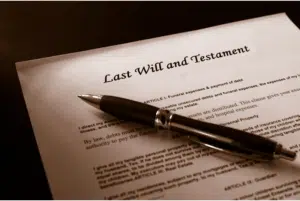Whether you are a personal representative or one of the heirs, it is crucial to understand how the probate process works and how to probate a will in Georgia. This helps you avoid mistakes, delays, or disputes, which could lead to unnecessary costs or legal problems.
While the process may seem complex, arming yourself with knowledge and guidance from a probate lawyer can help you navigate the process smoothly.
You could be starting your research or already in the midst of handling the estate — either way, we hope you’ll find this information helpful.
Probate is the legal process of settling a deceased person’s estate affairs.
The process involves having to:
As per Georgia Law, you are not required to probate an estate in court. However, the law will require you to present the original will to the appropriate probate court.
Carrying out the probate process can protect your loved one’s assets and ensure everything is in order. Without probate, you could run into issues for titled property such as vehicles, business interests, and real estate.
In some cases, financial institutions may also freeze accounts until the court appoints an executor or administrator. Subjecting estate to probate may seem like an intimidating option, but it can save you potential headaches down the road.
No, but it is usually a good idea for estates to go through probate to avoid future liability.
Probate assets must go through the proceedings to ensure correct distribution. These assets belong solely to the deceased person or have a shared interest with another party but without survivorship on the title.
Non-probate assets, on the other hand, do not require probate as they have an intended recipient. The financial institution can transfer these assets directly to the designated beneficiary (or beneficiaries).
For a will to be considered valid, it must meet specific requirements, which include the following:
The probate process in Georgia typically has three phases: appointment, administration, and distribution and discharge.
During the first phase of probate, the Probate Court appoints someone — a personal representative — to manage the estate.
If there is a will, the deceased will have named someone to fulfill their wishes. This person must file paperwork with the Probate Court to become officially appointed as the executor.
If no will exists, someone, usually a family member, would file with the Probate Court to be appointed as the administrator.
The person who wants to become a personal representative must get the heirs to sign consent forms to speed up the process. Then, they must take an oath in front of the Probate Court, swearing to follow Georgia’s laws and the will (if it exists).
Once the probate court approves the request, the petitioner will receive a court order appointing them to the role and specifying the scope of their power.
After the appointment stage, the personal representative will now begin to administer the estate. Their primary goal will be to gather all the deceased person’s assets (like bank accounts and real estate) and pay outstanding creditors.
The personal representative will begin by running a creditor/debtor ad in the local newspaper. This ad will run for four weeks, and the estate will stay open for another three months to allow creditors time to come forward and file a claim.
They will then need to satisfy all creditors before distributing any remaining assets to the heirs or beneficiaries.
To manage the estate’s funds, they must open a bank account and keep an inventory and accounting of all assets.
The final stage of the probate process in Georgia is distribution and discharge. This is where the personal representative distributes the remaining assets to heirs and beneficiaries before closing the estate.
The executor or administrator must ensure that everything goes to the right people, and conclude this step by filing the proper paperwork with the Probate Court.
Once the Probate Court accepts the discharge paperwork, the estate will be considered closed. This step helps relieve the personal representative of any future liability tied to the estate.
“Personal representative” is a catch-all term for either the executor or administrator.
The executor is the person indicated in a will to carry out the deceased’s instructions.
This person is responsible for managing the decedent’s assets and liabilities, satisfying creditors, and distributing the remaining estate assets according to the will. The executor must also file the necessary paperwork to open the probate case and keep all parties informed.
When a person dies without a will, or if the executor named in the will cannot serve, the court may appoint an administrator.
The administrator shares the same responsibilities as the executor, but if there is no will, they must also follow the GA intestate law.
The heirs and beneficiaries of the estate may have a passive role during probate, but it is still important for them to stay in the loop. They should be aware of the probate case’s status and any decisions made on asset distribution.
To speed up the process, they may need to provide information to the executor or administrator. We typically encourage beneficiaries to maintain open communication with the personal representative, so they can ask questions and seek clarification when needed.
By staying informed and involved, beneficiaries can help settle matters efficiently and be able to voice their concerns if anything seems suspicious.
Probate timeline varies from state to state, but in Georgia, non-dispute probate can take anywhere from 12 months to 18 months.
Probate can take a bit longer when there are many heirs because more work is required. Also, having more people involved can sometimes increase the likelihood of disputes, prolonging the whole process.
Unfortunately, when disputes arise, there is no way of knowing how long the probate process could take.
There is no timeline on when to file for probate after a death in Georgia. Under Georgia Law, an estate does not have to be probated.
However, if you have the will, you must present the original document to the appropriate Probate Court. Georgia probate law does not require an estate to be opened with the probate court.
As a practical matter, however, most, if not all, estates should go through probate to protect against liability and prevent potentially costly problems in the future.
Probate can sometimes spark disagreements among beneficiaries, whether over asset distribution, interpretation of the will, or varying viewpoints.
When a dispute happens, it is best to address it promptly to minimize any impact on the estate and everyone involved.
Mediation or negotiation can usually resolve most disputes with the assistance of a lawyer. If the dispute cannot be settled, the parties may have to go to the local Probate Court.
Regardless of the outcome, it is always smart to handle disputes respectfully and reasonably to preserve good relationships among family members.
It is possible to avoid the probate process through careful estate planning.
There are several ways to do this, including establishing a trust, transferring assets to a beneficiary through a payable-on-death designation, or holding assets jointly with the right of survivorship.
However, avoiding probate may not be the best option in every case. Speak with an attorney to discuss your situation and determine the most recommended action.
These methods also apply to someone who is still alive. After they pass away, there is little you can do to avoid probate if these steps were not taken. That holds true regardless of whether you are the personal representative, heir, or beneficiary.
Having assets in multiple states can further complicate the probate process.
There may be a need to open probate proceedings where the deceased person had assets in each state. This can lead to additional time and expense and will require coordination between the various proceedings.
In some cases, it may be possible to transfer assets between states through ancillary probate proceedings, but this can also be tedious without the assistance of an attorney.

This step allows the executor or administrator to step down from their duties and protects them from any future issues related to the estate.
During the closing of probate in Georgia, the personal representative will have to make certain disclosures. These disclosures typically include providing an inventory of all assets and their values, listing any disbursements made from the estate, and specifying any paid debts or liabilities.
The personal representative must also file a discharge petition. This is a legal document that requests the court to release them from their duties as the executor or administrator. This discharge petition typically goes with all the necessary documentation and proof that the required tasks have been completed in accordance with the law.
Once the Probate Judge approves the discharge petition, the personal representative will be released from their duties, and the probate process will be officially closed. The estate assets will then be distributed to the beneficiaries or heirs, as specified in the will or intestate succession laws, and the estate is settled.
It may be possible to hasten the probate process in Georgia if there is a pressing need for the estate to be settled quickly.
For example, there may be outstanding debts and bills that need to be paid, or there are beneficiaries who rely on the distribution of assets to meet their urgent needs.
Additionally, if the estate is relatively simple and there are no disputes among the beneficiaries, the probate process can often be completed more quickly.
The probate process in Georgia can be a confusing and time-consuming experience. Regardless of what stage you are in, we highly recommend consulting with a probate attorney who understands the process. This allows you to ensure that everything goes smoothly while avoiding legal issues. Contact our office at (770) 796-4271 if you need legal support.
Disclaimer These websites have not been reviewed by Georgia Probate Law Group and are not endorsed or even recommended by Georgia Probate Law Group. These websites are additional resources that you can use to further your general education on this topic.
Disclaimer: The information above is provided for general information only and should not be considered legal advice. Our probate attorneys provide legal advice to our clients after talking about the specific circumstances of the client’s situation. Our law firm cannot give you legal advice unless we understand your situation by talking with you. Please contact our law office to receive specific information about your situation.
Compassionate listeners, knowledgeable guidance. Schedule a free consultation with our team and let us help you and your family with your legal concerns.
GET IN TOUCH 770-796-4685Learn Important Probate Essentials, including key things that go wrong in an estate, how to prevent them, and what to do if they happen.



© 2025 Georgia Probate Law Group by Broel Law, LLC. All rights reserved.